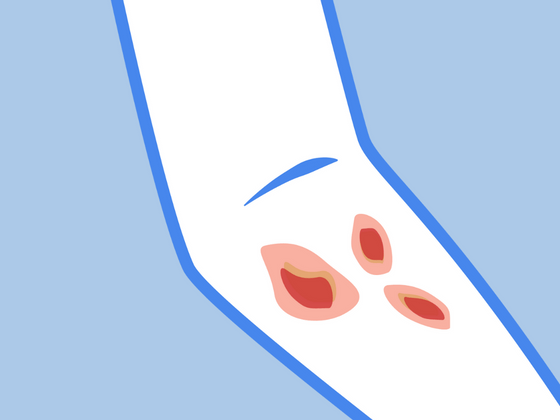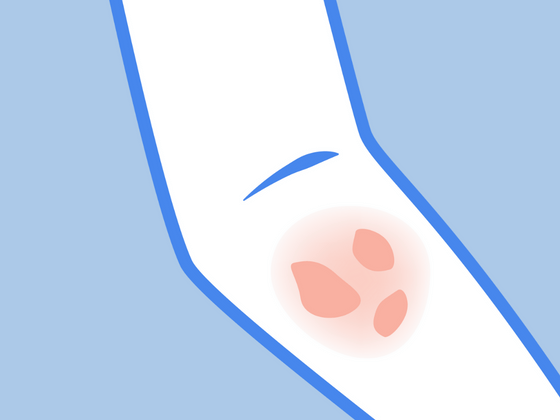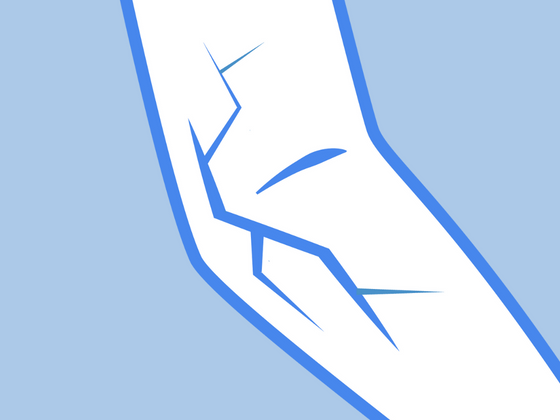Eczema is an inflammatory skin condition that causes the skin to become red, flaky, and inflamed. While it normally develops in the creases of the elbows and knees, it can also appear in the genital area, including on the vagina and on the shaft of the penis. Read on for causes and treatment options for penile eczema.
Please keep in mind that although what we discuss in this post can relieve eczema, we are in no way medical professionals. If you’re experiencing severe eczema symptoms like an infection, it is best to seek medical advice immediately.
Eczema on Penis
As eczema is the umbrella term for a group of inflammatory skin diseases, there are several different types of dermatitis that can affect the penis.
Atopic dermatitis: This type of eczema causes a rash or itchy bumps. Although it typically develops in childhood, it can also occur in adulthood. Unlike contact dermatitis, it can occur even if the skin hasn’t come into contact with an external allergen.
Contact dermatitis: This results from contact with an allergen or chemical. Specifically for eczema on penile skin, irritants can include condoms, underwear, or any type of athletic equipment that comes into contact with the penis.
Seborrheic dermatitis: While seborrheic dermatitis commonly appears on the scalp due to the oil glands, it can also appear on the penis.
What Causes Penile Eczema?
Like all types of eczema, the exact cause of eczema on the penis is unknown. However, it can possibly be linked to environmental and genetic factors. This can include a family history of eczema or external factors in the environment.
Possible irritants include soaps or body wash, latex, fragrances or chemicals found in beauty products, metals, or formaldehyde. When the body comes into contact with any of these triggers, the immune system is prompted to produce an inflammatory response. For those with eczema, this can result in a flare-up.
Is Penile Eczema Contagious?
No, penile eczema is not contagious. It cannot be spread through sexual intercourse or by touching someone with the penis. That being said, a flare-up can make sexual intercourse uncomfortable. In addition, if scratching leads to bleeding, sores, or blisters, the penis can become infected. Infections can be spread through unprotected sex.
How to Heal Eczema on Penis
Bathe in Warm Water
An excellent way to soothe itchy symptoms is to take a lukewarm bath. Be sure not to use hot water as this can exacerbate symptoms.
Moisturize
Keeping the skin moisturized is an important way to combat the drying effects of eczema. As always, but especially when dealing with sensitive areas, we recommend natural creams and balms as they are less likely to lead to a bad reaction from chemicals or toxins. We love this Organic Manuka Skin Soothing Cream. Handmade, with just six ingredients - including Manuka Honey - this is a gentle, oil-based balm heals without any burning or stinging. Plus, it has anti-inflammatory and anti-bacterial properties.
Aloe Vera
Aloe vera offers a cool treatment to inflamed or irritated skin. To relieve any itchiness, we recommend this Organic Aloe Vera for Eczema Skin Soothing Spray because it works great anywhere on the body - including sensitive areas! - thanks to its non-greasy formula.
Protective Underwear
Remedywear™ (TENCEL + Zinc) MEN'S Boxer Briefs - These feature TENCEL fibers embedded with zinc oxide perfect for soothing jock itch, buttocks, groin, or penile eczema. The moisture-wicking properties ensure no chafing or sweaty irritation, plus the latex-free elastic waist band secures the fabric in place to prevent rubbing, sliding, or pinching.
Men's Drawstring Boxers - These drawstring boxers are hypoallergenic, making them great for those with sensitive skin. With an easy access fly opening, the soft drawstring closure allows you to adjust them to fit as desired.
References:
https://www.healthline.com/health/skin-disorders/eczema-on-penis
https://greatist.com/health/eczema-on-penis
https://www.medicalnewstoday.com/articles/325286
------------------

Bio: Laura is a contributor and content developer for The Eczema Company. She is in no way a medical professional. Her comments, suggestions, and reflections are not intended to replace any medical advice. Always seek the help of a medical professional before undertaking any diet or lifestyle changes








